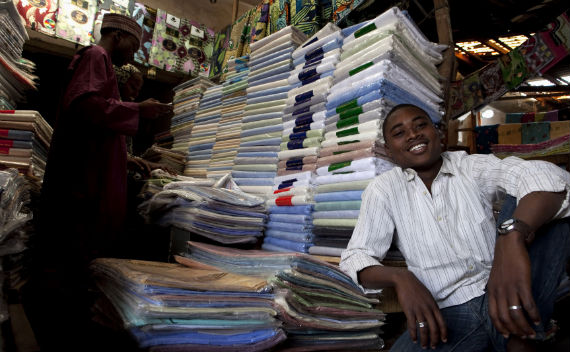Chinese Investment in Nigeria
More on:

Given that Nigeria has the second largest economy in Africa and that its population of almost 160 million includes one out of every four or five sub-Saharan Africans, the Chinese presence is relatively anemic. A press report of an exchange between Rong Yansong, the economic and commercial counselor of the Chinese embassy in Abuja, and Samuel Ortom, the Nigerian minister for trade and investment, provides a window into some of the issues.
Yansong claimed that Chinese enterprises in Nigeria employ over forty thousand Nigerians. In a country as big as Nigeria, and where Chinese involvement is heavily in construction, this does not seem to be a large number. A long-standing Nigerian complaint is Chinese reluctance to use Nigerian labor, including the unskilled labor often required at construction sites in developing countries. Yansong appears to be responding to that complaint. He also said that the value of trade and investment between China and Nigeria is now 8.2 billion dollars and could reach ten billion dollars by the end for the year. For comparison’s sake, the value of U.S.-Nigeria trade in 2010 was about 34.6 billion dollars and U.S. direct investment (PDF) in Nigeria in 2009 was about five billion, mostly in the oil sector. Nigerians have long complained that the reality of Chinese investment in Nigeria does not match its rhetoric though.
The Nigerians also regularly complain that the Chinese destroyed the Nigerian textile industry by flooding the domestic market with shoddy textiles, which often enter the country illegally with the connivance of Nigerian customs officials. In response, where it is possible, the Nigerian authorities have tried to tighten enforcement of various inspection regimes for imports. In their conversation, the press reports that Yansong asked Minister Ortom to secure final Nigerian approval of a draft agreement on industrial inspection. In response, Ortom apparently assured Yansong that his ministry’s mandate is to ensure that Nigeria’s trade and investment environment is conducive for foreign investors. But the press does not report him as responding directly to Yansong’s request.
The Chinese are trying to develop their economic ties with Nigeria. But they must overcome the popular Nigerian perception that they are racist – hence their unwillingness to use African labor– and that they are predatory – hence the view that they destroyed the indigenous Nigerian textile industry. Chatham House has published a fascinating report on then-president Olusegun Obasanjo’s efforts to trade oil blocks for Chinese infrastructure construction – with a big off-the-top to finance his political ambitions. It all went to bits when Umaru Yar’Adua became president and annulled most (not all) of the contracts.
More on:
 Online Store
Online Store